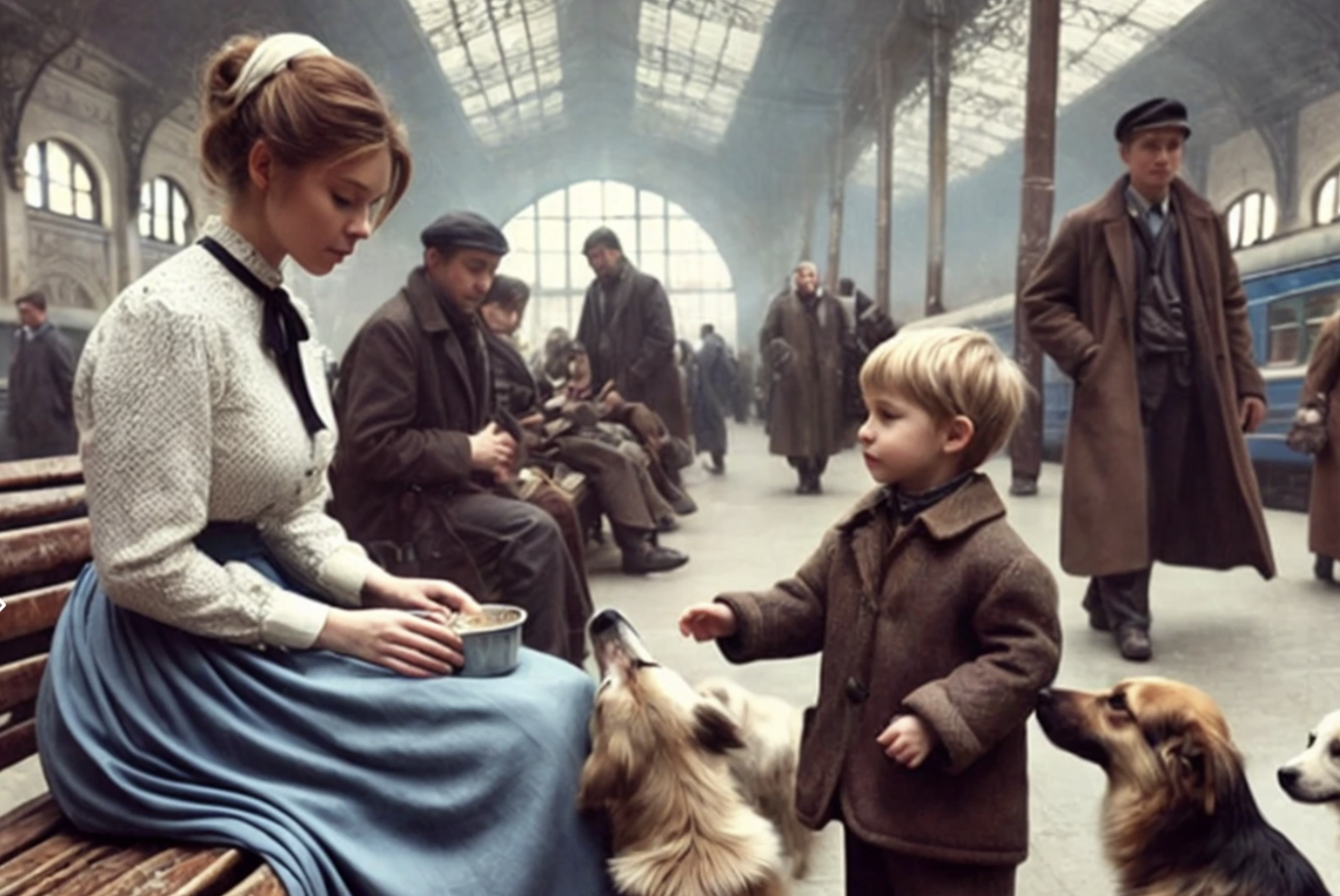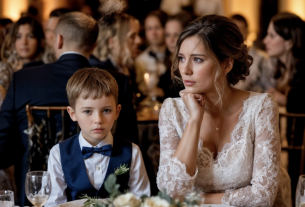A fragile girl with soft eyes stood at the train station holding a large bag of food. She came here almost every day to feed the homeless dogs. These places were a sanctuary for dozens of animals, and Alena knew them all as if they were her old friends.
“Come here, buddy,” she called gently to a black dog with a tattered ear, who always kept to himself.
The dog initially froze in place, looking around as if checking for a trap. Then, sniffing the air and catching the scent of sausages, he overcame his fear and approached cautiously.
“There you go, good boy,” Alena whispered, handing him a piece.
She smiled, seeing how the dog took the treat and quickly jumped back as if afraid he would be chased away. Her hands skillfully tore the remaining sausages into small portions. Other dogs were already waiting, wagging their tails.
“For you, and you, and you,” Alena said quietly, tossing the treats.
It seemed she knew each dog by name. Here was a ginger one—his paw limped slightly, and over there a white one with spots who always took her food and left first.
But this time, something was different. At some point, she felt a strange presence, as if someone was watching her intently. Alena turned around.
Behind her stood a little boy, about eight years old, no more. He was dressed in an old jacket, stained with mud, which hung on him like a sack. His face, thin and tired, betrayed his hunger, but his eyes showed no fear. Instead, there was stubbornness and a strange hope.
“Auntie…” he began hesitantly. His voice was quiet, but there was a heaviness in his tone.
“Yes?” Alena asked softly, leaning toward him.
The boy lowered his head, as if gathering his thoughts. Then he looked up and exhaled:
“I want to eat too… Can I have a piece?”
Those simple words struck her heart. Alena froze for a moment, staring at him. The boy’s voice was quiet, almost a whisper, but each word cut deep.
She looked at the remaining bag of food. There wasn’t much—just a couple of sausages and a piece of bread. But a thought was already forming in her head: “Of course, the dogs are hungry. But this child—he’s one of them too. Just from a different pack.”
“Of course, you can,” she replied, handing him a piece of bread with a sausage.
The boy took the food, quickly hiding it in his palms, and immediately began to eat, as carefully as if he feared the food might be taken away. Alena watched him, her heart tightening with sadness.
The food bag was still in her hands, but now she only looked at the boy. His hungry gaze clung to every crumb, every sausage, as if trying to satiate himself with just the sight of food.
“Do you live here?” she asked cautiously, trying not to frighten him.
The boy shook his head. His face remained calm, but something like shame flickered in his eyes.
“No. Just… it’s sometimes warm here,” he replied quietly, as if justifying himself.
Alena looked more closely. The boy’s clothes were worn out, the jacket clearly too big, its sleeves almost hiding his thin arms. His pants, torn in places, hung like a sack. On his feet were old, almost bald shoes. Yet, he stood straight, as if unwilling to show how hard it was for him.
“What’s your name?” she asked gently.
“Seryozha,” the boy replied shortly, looking down.
Alena sighed, looking around. The crowd buzzed: people hurried by, passing by, talking, but no one paid attention to this odd pair.
“Seryozha, wait here, okay?”
She handed him a piece of bread with a sausage, trying to make the gesture look natural. The boy took it carefully, as if it were a gift that could be taken away at any moment. He said nothing but nodded in gratitude.
Alena looked around again. The same indifferent passersby, car horns honking, somewhere in the distance trains clattered. She suddenly felt overwhelmed by a sense of helplessness: how can one live peacefully when right here, in plain sight, a child is starving?
She returned her gaze to the boy. He was chewing, but he did it slowly, biting off tiny pieces.
“Let’s do this,” Alena suddenly said, sitting next to him. “I have more food. Will you sit with me?”
The boy paused, his eyes not leaving the bag. His shoulders relaxed slightly, but he still looked at her with distrust.
“Really?”
“Of course,” she smiled. “And I want to talk to you. Just don’t be afraid, okay?”
The boy nodded silently. He sat down on the bench next to her, trying to keep a little distance. Alena handed him an apple, and Seryozha immediately hid it in his pocket, as if for later.
“Are you in a hurry?”
“No,” he replied briefly, looking away.
Alena looked at his face again—serious, too mature for his age. Her heart tightened. She understood that this conversation would not be quick. But she was ready to listen as long as it took.
They sat on a wooden bench not far from the station exit. The bench was old, with peeling paint, and creaked under their weight. Alena spread out in front of the boy everything that was left in her bag: a few slices of bread, a couple of apples, and those same sausages. The food seemed modest, but for Seryozha, it was a real feast.
The boy eagerly attacked the bread but ate not like a mindless hungry child, but carefully, in tiny pieces. He was clearly used to stretching out the little he had. As he consumed each piece, he looked as if he was afraid that it all might magically disappear if he hurried.
Alena watched him silently, not interrupting. Her heart clenched at the sight of the boy, but she knew—now the main thing was not to press.
“Have you been here long?” she finally asked, trying to speak as gently as possible.
Seryozha stopped chewing, pondered.
“I don’t know,” he shrugged. “A week, maybe. Maybe more.”
His voice was even, but this indifference carried a fatigue not typical for a child. Alena just nodded. She understood that prying further was pointless.
She briefly looked away, watching the crowd near the station. People rushed about their business, no one paying attention to them sitting on the old bench. And yet, despite the noise around, a special silence reigned between her and the boy.
“Parents?” she cautiously added after a pause.
Seryozha stopped eating. His hand with half a sausage froze, and he looked away. His gaze did not reveal an answer but some inner struggle. As if he himself didn’t know what to say. Or didn’t want to talk.
“They’re not here,” he finally said, briefly, almost cutting off.
His words were quiet, but to Alena, they were louder than any scream. In this calm, there was no trace of emotions—no pity for himself, no hope, no resentment. Only emptiness, which cut her more deeply than if he had cried.
She looked away to give him some space.
“Sorry,” she said, looking at the leftovers in the bag. “I shouldn’t have asked.”
Seryozha didn’t respond. He again lowered his gaze to the piece of bread in his hand and continued eating, just as slowly, piece by piece. Alena watched him, feeling that words here wouldn’t change anything.
She sighed, understanding that ahead was a difficult conversation. But now—only this moment, only the warm bench, and the food they could share.
When the food was gone, Alena still sat on the bench next to Seryozha. Around them, the station bustled: people hurried, heavy trains rumbled on nearby platforms, and the wind chased scraps of newspapers across the cobblestones. But she seemed not to hear any of this. Only watching the boy, who carefully finished his last piece of bread.
What to do next? Just stand up and leave? Pretend that this was just a random act of kindness? She herself couldn’t believe that one could just walk away and forget about this child.
She cautiously asked:
“Do you have a place to sleep?”
The boy, not raising his eyes, shrugged.
“There’s a platform. It’s warm there.”
He said this quietly, but as if it was the only thing keeping him afloat. The word “warm” he repeated with a slight, almost imperceptible tremor in his voice. Alena knew that tone—those who are holding on by a thread speak like this.
Her heart clenched.
“Listen, Seryozha,” she said, thinking for a moment. Her voice was soft, but determination was already audible in it. “I have a cat at home.”
The boy looked up, surprised.
“A cat?”
“Yes,” she smiled. “His name is Vasily. He’s ginger and fat. Loves guests. Especially those who come with sausages.”
Seryozha squinted slightly, as if checking whether she was joking.
“Can I see him?”
Alena felt something warm spread inside her. She nodded, stood up from the bench, and held out her hand.
“Let’s go. He’s just waiting for his portion.”
The boy hesitated for a moment but then decisively took her hand. It was a timid, light gesture, but to Alena, it meant more than words.
On the way, she stole a glance at him. Seryozha was thin, almost transparent, but now his face had changed. A faint glimmer appeared in his eyes.
And for the first time in a long time, he smiled. It was a small, shy smile, but so genuine that Alena knew: she had made the right choice.



